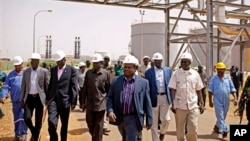South Sudan has resumed oil production, bringing cheers from citizens and a boost to the economy after a halt of more than a year.
The long-awaited resumption of production comes after Sudan and South Sudan signed a series of agreements last month in Addis Ababa, including on oil production. On Saturday, Minister of Petroleum Stephen Dheu Dau restarted the Thar Jath oil field in Unity State.
“By launching today the oil production resumption in Thar Jath is a message of commitment of the leadership the government and the people of South Sudan and to comply with the agreement signed with Sudan,” he said.
Only the field in Thar Jath, which has a capacity of 10,000 barrels a day, is currently online. Ten thousand barrels is a fraction of the 350,000 barrels per day that South Sudan was pumping a day, before the shutdown in Janaury last year.
South Sudan gained control of three-quarters of Sudanese crude production when it split away from Sudan in July 2011, but oil from the landlocked country has to be transported through pipelines running through Sudan to export seaports in the north.
Juba shut down production following a row with Khartoum over pipeline and other oil fees.
South Sudan's larger oil fields in Upper Nile, which used to produce the bulk of South Sudanese crude, will restart production as soon as a pipeline inspection is completed, Dau told a news conference on Monday.
Repairs are currently under way at those fields, which were damaged during fighting and will only gradually ramp up to full capacity.
"Upper Nile used to produce 250,000 a day. In the beginning we will start gradually, maybe 180,000. Within one month or two we will be at the normal production,” said Dau.
South Sudanese crude is expected to be shipped from ports in Sudan at the end of May -- a month later than originally predicted -- and revenues from oil sales should begin streaming in by the end of June or early July, Dau said.
Prior to the production shutdown in January last year, sales of crude accounted for 98 percent of government revenue in South Sudan. Austerity measures imposed after the halt of production have impacted people in both Sudans.
South Sudan Oil Flows Again

BENTIU, SOUTH SUDAN —



